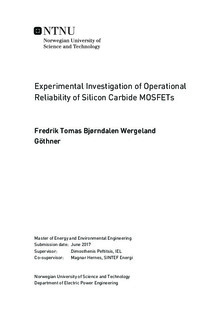Experimental Investigation of Operational Reliability of Silicon Carbide MOSFETs
Master thesis
Permanent lenke
http://hdl.handle.net/11250/2450661Utgivelsesdato
2017Metadata
Vis full innførselSamlinger
- Institutt for elkraftteknikk [2457]
Sammendrag
As the performance of silicon power semiconductors is close to the theoretical limit, other semiconductor materials are sought to improve power electronics system efficiency. Devices made with the wide bandgap material silicon carbide (SiC) are promising due to the possibility of significantly improved system efficiency and reduced system volume and weight. However, reliability is still a key issue to be dealt with before wide-spread use of the devices may take place.
In this thesis two of the largest reliability concerns of the SiC MOSFET are evaluated by investigating discrete devices. The issues are the threshold voltage instability and the reliability of packaging of the devices. Dedicated test benches were established to study the issues. The tested devices indicate that the drift of the threshold voltage is still an issue for SiC MOSFETs.
The methodology of performing power cycling tests was investigated. This accelerated life time stress test can be utilized to evaluate packaging reliability. The tests were performed by using the Vsd(T)-method to evaluate the junction temperature.
Several devices were tested, all of which indicated failure by bond-wire lift off. The results furthermore indicate that power cycling of SiC MOSFETs is affected by the threshold voltage instability. In particular, a reduction of the on-state voltage was observed at the beginning of almost all the tests, which was attributed to the instability of the threshold voltage. The results call for a discussion as to how power cycling of SiC MOSFETs ought to be performed, in order to reduce the influence of the threshold voltage drift. A suggestion for reducing the influence of the latter is also given.
